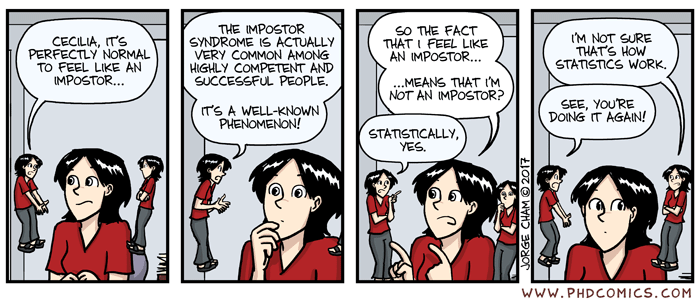Imposter Syndrome Syndrome
Published:
I wrote this some time ago, but wasn't going to post it because there are so many posts about Imposter Syndrome that the need to write them is almost a field in itself (Imposter Syndrome Syndrome!). However, I try to keep this blog ticking along once a year and I haven't posted in 2017 so far and there's only like 40 minutes left of it, so it will have to do.
Imposter Syndrome is so well know it has it's own wikipedia page. You don't need to know more about it, and are probably thinking great, thanks Andrew. That's all we need, another blog post strategy for handling imposter syndrome. I've heard about it. That doesn't help me. I still feel like one. The uselessness of most imposter syndrome advice is shown in this hypothetical exchange:
A: "I feel like an imposter."
B: "Everyone feels like an imposter, it's even got a name: "Imposter Syndrome. So you really don't have to worry"
A: "Wait! All that means is that lots of people feel like imposters. That doesn't prove I'm not an imposter, just that there are lots of people who feel the same way. There has to be a true imposter in there somewhere. It's probably me. "
End scene. Which is what I often hear when that advice is said to me. It was also summed up nicely in a PhD Comics entry this year:
 |
| PhD Comics said it best |
It doesn't help me that everyone feels the same way - they've all just got the syndrome, and I've got probably got the real thing.
Hearing about others doesn't help your mind which is so focused on your flaws. You want data. You want analysis. You want proof.
So, here is an attempt at that.
You feel like an imposter but your not sure. How can we proceed. Probability might be able to help.
So let's do some dodgy maths:
Say 1% of people in [insert your field here] are true imposters.
Say 99% of people feel like an imposter.
Conditional probability tells us:
Pr (A|B) = P (A and B) / P (B)
so:
Pr (You are an imposter | You feel like an imposter) = Pr (You are an imposter and You feel like an imposter) / Pr ( You feel like an imposter)
Given that imposter syndrome is pervasive, and nobody really knows if they are an imposter or not, then we could declare them independent. This holds up anecdotally - if there are true imposters, and they aren't even sure if they are, then being one and feeling like one seem to have no impact on each other. This makes the maths easier, but it also feels true.
P(A and B) = P(A) * P(B)
therefore
Pr (You are an imposter and You feel like an imposter) = Pr (You are an imposter ) * Pr (You feel like an imposter)
therefore
Pr (You are an imposter | You feel like an imposter) = Pr (You are an imposter and You feel like an imposter) / Pr ( you feel like an imposter) = ( Pr (You are an imposter ) * Pr (You feel like an imposter) ) / Pr ( you feel like an imposter)
which cancels out to
Pr (You are an imposter )
which cancels out to
Pr (You are an imposter )
Which is right back where we started. Don't @ me with the flaws in this maths.
Pr (You are an imposter | You feel like an imposter) = Pr (You are an imposter )
Pr (You are an imposter | You feel like an imposter) = Pr (You are an imposter )
There are 1% imposters and a 1% chance you are one if you feel like one. We didn't even need those values for feeling like an imposter, or the true prevalence. They're irrelevant.
Feeling like an imposter doesn't make a difference to the probability that you likely are actually to be an imposter.
So strategy one is to just forget about it. There's no real way of knowing if you are an imposter, feeling like one makes no difference statistically speaking, so you may as well just carry on. Does this help?
Probably not.
